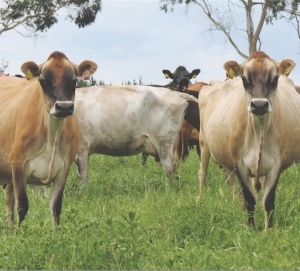The summer season is a time of long days, hot nights and hopefully a busy party scene. But life also goes on around the dairy farm. The girls have to be milked, irrigation attended to, summer pastures topped, bulls run out with the herd and autumn cows pregnency tested and dried off.
With such a positive milk price this season for most farmers, you should consider an early round of pregnancy testing this January for spring calved cows. Testing the cows five-six weeks after the bulls were put in will allow you to determine which cows are pregnant to AI because the cows pregnant to the bulls will be not detectably pregnant yet, or are easily distinguished as five-six week old pregnancies, not to be confused with the older pregnancies conceived by AI.
In times of strong milk prices this is about the best value for money on your farm. For example, a farmer who does not pregnancy test early cannot distinguish between a calf conceived by AI and one conceived weeks later to the bull, as shown during pregnancy testing later in the year (April-May) or using a milk or blood test later in pregnancy. So they will have to dry a pregnant cow off to her earliest possible calving date to ensure she gets a 42-60 day dry period, which is about ideal.
But if she is 6 weeks less pregnant than you thought, you have wasted up to 42 days of milk – as much as 700-800 L, possibly several hundred dollars for each cow in this category.
Most herds I pregnancy test have at least 10-15% of their cows with a single AI date and no other recorded mating that are pregnant to the bull, so you could be losing many thousands of dollars in lost milk across the herd if you do not determine when a cow is likely to calve and dry her off at the optimal time.
Also, cows with dry periods exceeding 90 days have much poorer transition outcomes than those going through the ideal dry period.
Not knowing for sure can also mean that cows spend far longer than ideal times on the lead feed diet, with serious metabolic consequences possible.
Remember that school holidays are a high-risk time for farm injuries and fatalities. Keep a close eye on the kids if they are ‘helping’ onfarm; ensure they are either fully instructed or adequately supervised.
• Rob Bonanno is a past-president of Australian Cattle Veterinarians Association and a director of the Shepparton Veterinary Clinic.
















